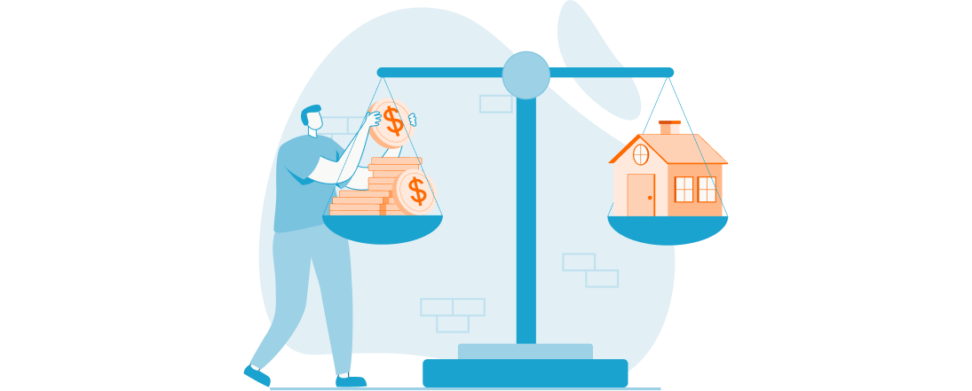Utah Senior Citizen Mortgage Loans
- No personal information required
- No upfront deposit for appraisal or credit report required
- Expect to save money

If you are a senior citizen in Utah and want to get a mortgage, you might think your chances of approval are low. Older adults who have already retired might be relying on Social Security retirement benefits and retirement account savings and no longer have income from work. While the process of securing a home loan might be more challenging for seniors than for younger adults, some mortgages are available for seniors and meet their unique financial profiles and needs. Here’s a guide to Utah senior citizen mortgage loans from City Creek Mortgage.
Is It Possible for Seniors to Get Mortgages?
The Equal Credit Opportunity Act is a federal law that was enacted in 1974. This law prohibits discrimination in any credit transaction, including mortgages, based on the protected characteristics of a prospective borrower. Among other protected statuses, it is illegal for lenders to discriminate against senior citizens in mortgage lending.
Lenders may not base a decision to deny a mortgage to a senior citizen because of their age. This means you should be approved for a mortgage regardless of your age as long as you meet the following criteria:
- Acceptable debt-to-income (DTI) ratio
- Good loan-to-value (LTV) ratio
- Good credit score
- Sufficient assets
- Provable income for at least the next three years
The area in which seniors typically run into challenges with getting a home loan is income, especially if they have retired and receive Social Security benefits. An applicant will have to show they have sufficient income and assets to continue making their mortgage payments when other common challenges, including medical problems, are factored in. Seniors who plan to retire within a couple of years should consider what their post-retirement income will be before choosing to move forward with a mortgage.
Reasons Why Seniors Might Want to Get a Mortgage
Seniors might want to get mortgages in Utah for multiple reasons, including:
- Wanting to refinance an existing mortgage with a high rate of interest
- Wanting to access the equity in your home for renovations, other expenses, or for a downpayment on a vacation property
- Wanting to consolidate high-interest debt
- Wanting to downsize to a smaller, more manageable home
- Facing physical challenges with upkeep and maintenance
- Supplementing a fixed income
- Wanting to move to a different area
If any of these reasons apply to you, it might make sense to get a new mortgage. Regardless of why you might want to apply, it’s important to understand the process, the challenges involved, and the available mortgage options.
What Is the Mortgage Process During Retirement?
Younger borrowers typically submit W-2s, pay stubs, and income tax returns to prove their income when they apply for mortgages. When you retire, however, you will no longer receive W-2 forms or have pay stubs. Instead, you’ll have to submit other documentation showing your income, including:
- 1099s from IRAs showing payments
- Social Security annual award letter and proof of recent receipt of benefits
- 401(k) statements
- IRA statements
- Investment account statements
- Documents showing the receipt of dividend and interest income for at least two years
- Statements from IRAs, pensions, 401(k)s, etc. showing they provide you with income and the amounts
- Income tax returns showing receipt of retirement income
According to Freddie Mac’s lender guidelines, lenders can count retirement income for mortgage approval purposes. However, borrowers must show that the income will likely continue for a minimum of the next three years. Lenders are allowed to include dividends and interest, trust fund payments, Social Security retirement benefits, pensions, IRAs, and 401(k) payments.
Common Challenges for Seniors When Seeking Mortgages
Even though lenders are prohibited from discriminating against senior citizens in the mortgage lending process, it can still be more challenging to be approved for a loan. A study titled “The Age Gap in Mortgage Access” completed by the Federal Reserve Bank of Philadelphia and published in 2023 found that people are more likely to be denied mortgages as they grow older.
For example, the study found that 17.8% of applicants overall are denied mortgages. By contrast, 19% of those in their 60s and 20% of those who are 70 or above were denied in the Federal Reserve’s study.
There are a few common challenges when seeking a mortgage as a senior citizen. Knowing what to do about them might increase your chances of approval.
1. Not Having a Regular Income
Lenders must verify that borrowers will be able to make their mortgage payments. Seniors don’t have a regular cash flow from employment to show when they apply for mortgages. To combat this problem, make sure to gather all of the documents previously described to prove your income from Social Security, investments, dividends, interest, retirement accounts, pensions, etc.
You’ll need to show that you can access these funds. If you are younger than 59 1/2, the lender won’t count the future payments you might receive from an IRA or 401(k) because you’ll face a 10% early withdrawal penalty. You must show you have full access to your funds without penalty. You’ll also need to show that your retirement income is sufficient to afford the mortgage payments on top of your living expenses, utilities, and other bills.
2. Retiring Within the Near Future
If you haven’t retired but are nearing retirement age, you might run into a different obstacle if your income from work will likely end within the next three years. Lenders will need to verify that you will continue receiving income for a minimum of three years after the closing date of your mortgage.
If you plan to retire in one or two years, you won’t meet the continuing income requirement. However, you can opt to wait to retire for more than three years after applying for a mortgage and not share your retirement plans with a prospective lender. You’ll still need to make sure you will be able to afford to pay your mortgage post-retirement even if you don’t plan to retire for a few years.
3. Retirement Fund Expiration Dates
Underwriters typically consider retirement account distributions to have a set expiration date. This is because as you withdraw funds, the total balance is depleted. To combat this challenge, you’ll need to show you will receive continuing income from retirement accounts you are relying on to qualify for a minimum of three years.
Keep in mind that bonds, mutual funds, and stocks are viewed as volatile assets. As a result, lenders typically only count 70% of your retirement account balances to figure out the remaining years of distributions.
Mortgage Options for Seniors in Utah
Despite the challenges, seniors have multiple options when they want to get mortgage loans in Utah. Here are some of the options based on your situation and needs:
Asset Depletion Mortgage
If you are already retired and don’t have a regular income, one option you might consider is an asset depletion mortgage. This type of loan is designed for refinancing an existing mortgage or buying a new home for people who don’t have regular incomes.
Lenders calculate the qualifying income of applicants differently for asset depletion mortgages, but these loans work similarly to traditional mortgages.
To qualify for this type of home loan, you’ll need to show you have substantial liquid assets and cash reserves. The lender will divide your liquid assets by the number of months in the loan’s term to calculate a monthly amount to count as your income and confirm whether you can afford to make your payments.
To qualify for an asset depletion loan, you must have a substantial amount in savings that is accessible. You’ll also need to present documents showing you regularly receive income from your assets and can be expected to continue doing so for three or more years.
Keep in mind that the lender will consider your assets as collateral for the asset depletion mortgage. If you can’t make your payments and default, the lender can seize your liquid assets.
Conventional Mortgage Loan
Another option is a conventional mortgage. If you are receiving Social Security income, lenders typically consider it to be a reliable and continuing income source. To qualify, however, you’ll need to have a good credit score, a low DTI, and possibly, a large down payment.
In general, you’ll need to have a minimum credit score of at least 620, a DTI of 45% or less, and you might have to make a down payment of up to 20%. Some lenders might require a higher minimum credit score, and others might require a smaller down payment. You should assume you’ll need strong credit, a low DTI, and enough money to put down if you want to get a conventional mortgage, however.
Fannie Mae Family Opportunity Home Loan
Another option that might be available is a Fannie Mae Family Opportunity Home Loan. This option allows your adult children to get a mortgage for you to buy you a home. If your children are willing and financially able, a Family Opportunity Home Loan might allow them to get a lower interest rate and more favorable terms, and you won’t be on the mortgage.
Unlike other loans that require borrowers to live in the home as their principal residence, the Family Opportunity Home Loan does not require your adult children to live in the home. This means they won’t have to treat it as an investment property.
This program can be a good choice if your children want you to move to a new home, are financially stable, and have strong credit. It is also a good option if your retirement income is too limited to qualify for a mortgage on your own.
Reverse Mortgages
Reverse mortgages are designed for seniors ages 62 and older who don’t want to move but instead want to tap into their equity to supplement their retirement income. These mortgages are backed by the Federal Housing Administration (FHA) and are called home equity conversion mortgages (HECMs).
If you get a reverse mortgage, you will receive money from the lender in payments, and the interest will be deferred until the loan matures. The balance owed will increase over time as your equity decreases. In many cases, it’s better to consider a cash-out refinance loan, a home equity loan, or a home equity line of credit (HELOC) instead of a reverse mortgage.
FHA-Backed Mortgages for Seniors
FHA mortgages, which are loans that are backed by the FHA, are easier to qualify for than conventional mortgages. To qualify, you will need to have a credit score of at least 580 with a 3.5% down payment, but some lenders might require you to have a credit score of 620 or above. An FHA mortgage will also require you to pay mortgage insurance premiums (MIP).
VA Loans for Seniors
If you are a veteran or the surviving spouse of a veteran, you might be eligible for a VA loan backed by the U.S. Department of Veterans Affairs (VA). These mortgages offer several benefits, including the ability to get a mortgage without making a down payment or having to pay private mortgage insurance (PMI). You can also count your Social Security income and military pension to meet the income requirements.
USDA Loans for Seniors
If you want to buy a home in a rural area in Utah and have a low to moderate income as a senior citizen, one option to consider is a mortgage backed by the U.S. Department of Agriculture (USDA). USDA loans have income limitations to ensure that people with low or moderate incomes can buy homes. A USDA loan is only an option in certain designated areas and typically will not require a down payment. You can count your Social Security income to meet eligibility requirements.
Things to Consider Before Getting a Mortgage as a Senior Citizen
You need to consider several factors before you decide to apply for a mortgage as a senior citizen, including:
- The costs you will have in retirement on an ongoing basis
- Living within your means so you won’t end up being in bad financial shape in retirement
- Potential healthcare expenses
- Chance of needing long-term care
- Potential tax benefits from owning a home
If taking out a mortgage makes sense given your needs and finances, you should be able to get a mortgage as long as you qualify.
Talk to City Creek Mortgage
No matter why you are thinking about getting a mortgage as a senior citizen living in Utah, it’s important to understand your options and the eligibility requirements. The mortgage experts at City Creek Mortgage can review your situation and help you understand what might make the most sense. Contact us today by calling (801) 501-7950.





